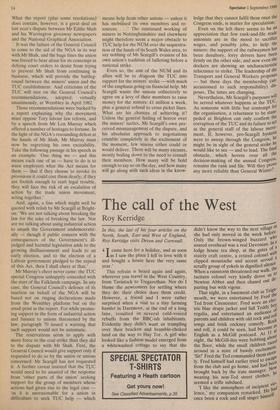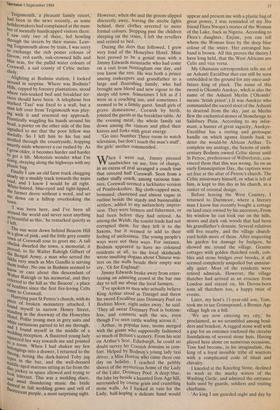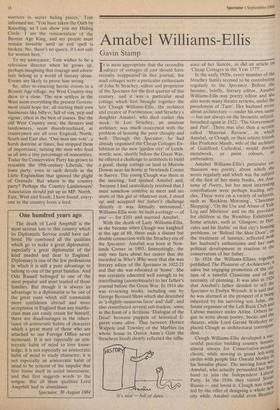The call of the West
Roy Kerridge
In this, the last of his four articles on the North, South, East and West of England, Roy Kerridge visits Devon and Cornwall.
T came here for a holiday, and as soon as I saw the place I fell in love with it and bought a house here the very same year.'
This refrain is heard again and again, wherever you travel in the West Country, from Tavistock to Tregavethan. Nor do I blame the newcomers for settling where they do: their choice does them credit. However, a friend and I were rather surprised when a visit to a tiny farming hamlet in Dartmoor, at the end of a long lane, resulted in several cold-voiced rebuffs from the BBC-ish inhabitants. Evidently they didn't want us trampling over their bracken and bramble-choked land on the way to Hay Tor. A girl who looked like a fashion model emerged from a whitewashed cottage to say that she
didn't know the way to the next village as she had only moved in the week before. Only the brown-winged buzzard IN" soared overhead was a real Devonian. In 3 lodge house tea shop, at the gates of a stately craft centre, a retired colonel with clipped moustache and accent served 3 scruffy group of yokels in dignified silence. When a rainstorm threatened our walk, the taciturn colonel very kindly drove us t° Newton Abbot and then chased our de' parting bus with vigour. That night, in a basement club in Teign" mouth, we were entertained by Fred the Ted from Cirencester. Fred wore an elec.. tric blue drape jacket and full Teddy I/ regalia, and entertained an audience 0,, parents and children with old rock and songs and brisk cockney comedy.110cs and roll, it could be seen, had become at English as a McGill postcard. At 11 at night, the McGill-ites were bobbing ahcilid the floor, while the small children race. around in a state of bawdy exciteMen" 'Sit!' Fred the Ted commanded themstern; ly. Fred himself had earlier tried to escaPti from the club and go home, and had heew brought back by the irate managel. Now wearing his non-Ted street clothes, " seemed a trifle subdued.io 'I like the atmosphere of incipient ha lence,' my companion remarked. He "; once been a rock and roll singer himse"
Teignmouth, a pleasant family resort, had been in the news recently, as some holidaymakers had complained at the num- ber of mentally handicapped visitors there. I saw only two of these, led howling through the streets by their nurses. Leav- ing Teignmouth alone by train, I was sorry to exchange the rich poster colours of bevon, red earth, oak-crowned hills and blue seas, for the pallid water colours of Cornwall, a sad county of Celtic melan- choly.
Alighting at Bodmin station, I looked
around in surprise. Where was Bodmin? Bills, capped by forestry plantations, stood Where rain-soaked bed and breakfast ter- races should have been. A telephone box Marked 'Taxi' was fixed to a wall, but a Man left over from Teignmouth was play- ing with it and resented my approach. Frantically waggling his hands around his 11,ead, a porter on the other side of the line signalled to me that the poor fellow was cloolally. So I left him to his fun and strolled through the countryside, hopping sniartly aside whenever a car rushed by. As I grow older, it becomes harder and harder to get a lift. Motorists wonder what I'm d°ing, straying along the highways with my Plastic bag.
Finally I saw an old farm truck chugging
SieWlY up a muddy track towards the main road, and I knew I would be all right. White-haired, blue-eyed and tight-lipped, the farmer drove without a word, and set me down on a hilltop overlooking the town.
was born here, and I've been all around the world and never seen anything as beautiful
I as this,' he remarked quietly as left.
. The sun went down behind Beacon Hill In a glow of pink, and the little grey county fMvn of Cornwall rose to greet me. A tall c'belisk dwarfed the town, a memorial, it Proved, to Sir Walter Raleigh Gilbert of tsh.,e Bengal Army, a man who served the fklOs very much as Mrs Gandhi is serving ku'eni today. No one in Bodmin seemed to ‘,1!mv or care about this descendant of waiter Raleigh or his memorial, and they referred to the hill as 'the Beacon', a place of bonfires since the first fire-loving Celts eanie to Cornwall.
Hurrying past St Petroc's church, with its Pie
ce of broken monastery attached, I found myself in narrow Honey Street, stitanding in the doorway of the Honeybee w?.tel. Polite young men in grey suits and and e carnations parted to let me through, vend f found myself in the middle of a s edding reception. A flustered young lady tr eezed her way towards me and pointed b .a room. When I had shaken my few bet room. into a drawer, I returned to the t:(311g, noting the dark-haired Toby jug inre ddsle-inthe bar, and the well-dressed
aged matrons sitting as far from the "
1,1,se jockey as space allowed and trying to and tolerant. This was a wedding disco, dad amid thundering music the bride nu"ed in full wedding gown and veil of
orescent purple, a most surprising sight. However, when she and the groom slipped discreetly away, leaving the strobe lights behind, their clothes reverted to more formal colours. Stepping past the children sleeping on the stairs, I left the revellers and retired to bed.
During the days that followed, I grew very fond of the Honeybee Hotel. Mine host proved to be a genial man with a Jimmy Edwards moustache who had come on a visit from Nottingham one day, and you know the rest. He was both a prince among innkeepers and grandfather to a large and flourishing family, who had brought new blood and new vigour to the sleepy old town. Sometimes I felt as if I were in a coaching inn, and sometimes I seemed to be a family guest. Small girls of grave demeanour, Cornish by birth, jointed the guests at the breakfast table. At the evening meal, the whole family sat down among the visitors and plied their knives and forks with great energy.
'Go into Number Three room to watch television, but don't touch the man's stuff, the girls' mother commended.
When I went out, Jimmy pressed sandwiches on me, free of charge, in an excess of zeal arranged a coach tour that covered half Cornwall. Seen from a rather stuffy coach, among vacuous tran- nies, Cornwall seemed a lacklustre version of Pembrokeshire. Big cloth-capped men, bemused, chastened and almost vague in outline beside the sturdy and businesslike settlers, added to my melancholy impres- sion. They were farmers and fishermen, or had been before they had retired. As among the Welsh, the tourist trade had not corrupted them, for they left it to the Saxons, but it seemed to add to their feeling of uselessness. The young people's ways were not their ways. For instance, Bodmin appeared to have no coloured residents at all, so the local skinheads wrote insulting slogans about Chinese wai- ters on the walls beside their empty war cry, 'Oi for England!'
Jimmy Edwards broke away from enter- taining an admiring crowd at the bar one day to tell me about the local farmers.
'I've spoken to men who actually believe King Arthur stood at Tintagel and threw his sword Excalibur into Dozmary Pool on Bodmin Moor, eight miles away,' he said. 'They all swear Dozmary Pool is bottom- less, and connects with the sea, even though I've seen cattle wading across it.'
Arthur, in popular lore, seems merged with the giants who supposedly fashioned so much of Britain's scenery. From his seat on Arthur's Seat, Edinburgh, he could no doubt survey his Cornish domains in com- fort. Helped by Bodmin's young lady taxi driver, a Miss Horton who came there one day on holiday, I reached the pebbly shores of the mysterious home of the Lady of the Lake, Dozmary Pool. A deep blue, the lake lay beside a haunted Iron Age hill, surrounded by coarse grass and crumbling stone walls. As I looked in vain for the Lady, half-hoping a delicate hand would
appear and present me with a plastic bag of great power, I was reminded of my Ibo friend Flora Nwapa's stories of the Woman of the Lake, back in Nigeria. According to Flora's daughter, Enjine, you can tell where the Woman lives by the deep blue colour of the water. Her estranged hus- band is brown. All this proves the theory I have long held, that the West Africans are Celts and vice versa.
My Ghanaian correspondent tells me of an Ashanti Excalibur that can still be seen embedded in the ground for any once-and- future king of pluck. The name of this sword is Okomfo Anokye, whch is also the name of the Ashanti Merlin ('Okomfo' means 'fetish priest'.) It was Anokye who commanded the sacred stool of the Ashanti to descend from the sky, just as Merlin flew the enchanted stones of Stonehenge to Salisbury Plain. According to my infor- mant, a hunter of great sagacity, Anokye- Excalibur has a rusting and grotesque handle on which agama lizards bask to deter the would-be African Arthur. To complete my analogy, the Saxons of sixth- century Bodmin owned Celtic slaves until St Petroc, predecessor of Wilberforce, con- vinced them that this was wrong. So on an early Emancipation Day, the captives were set free at the altar of Petroc's church. The Celtic missionary himself, or what is left of him, is kept to this day in his church, in a casket of oriental design.
Before leaving the West Country, I returned to Dartmoor, where a literary man I know has recently bought a cottage on land once owned by his ancestors-From his window he can look out on the hills, moors and dark oak woods that had been his grandfather's domain. Several relatives still live nearby, and the village church- yard holds more of them. After inspecting his garden for damage by badgers, he showed me round the village. Granite cottages with golden thatched roofs, cob- bles and stone bridges over brooks, it all seemed completely unspoiled but unnatur- ally quiet. Most of the residents were retired admirals. However, the village thatcher had arrived as an evacuee from London and stayed on, his Devon-born sons all thatchers too, a happy twist of events.
Later, my host's 11-year-old son, Tom, took me to see Grimspound, a Bronze Age village high on a hill.
'We are now entering my city,' he proclaimed, as we scrambled among boul- ders and bracken. A ragged stone wall with a gap for an entrance enclosed the circular foundations of several stone huts. Having played here alone on numerous occasions, Tom had become, in his imagination, the king of a loyal invisible tribe of warriors with a complicated code of ritual and chivalry.
I kneeled at the Kneeling Stone, declined to wash in the murky waters of the Washing Circle, and admired the entrance halls used by guards, soldiers and visiting chieftains.
'As king I am guarded night and day by warriors in secret hiding places,' Tom informed me. 'You have taken the Oath by Kneeling, so I can show you my Hiding Circle. I am the reincarnation of the Bronze Age King, and my people must remain invisible until an evil spell is broken. No, there's no queen, it's not safe for women here.'
To my annoyance, Tom wishes to be a television director when he grows up, perhaps imagining that courage and adven- ture belong in a world of fantasy alone. Events are likely to prove him wrong.
So, after re-enacting heroic events in a Bronze Age village, my West Country stay drew to a close. The new settlers in the West seem everything the present Govern- ment could hope for, all starting their own businesses like billy-o, full of vim, pep and vigour, often in the best of causes. But the old West Country men, the farmers and landowners, seem disenfranchised, as countrymen are all over England, North, South and East also. 'One man one vote', a harsh doctrine at times, has stripped them of importance, turning the men who feed us all into a tiny percentage of nonentities. Today the Conservative Party has grown to resemble the 19th-century Liberals, the town party, even in such details as the Little Englandism that ignored the plight of Grenada. But where is the country party? Perhaps the Country Landowners' Association should put up an MP. North, East, West and South, I have found, every- one in the country loves a lord.












































 Previous page
Previous page